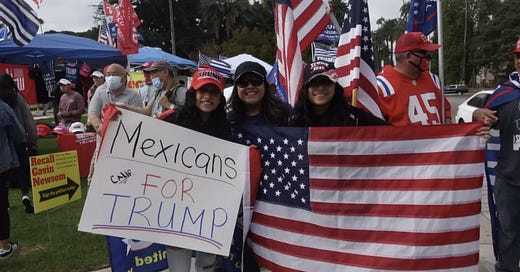Should Latino/Hispanic Caucuses be Bi-Partisan?
The growing number of Latino Republicans is challenging some basic assumptions about minority voters.
In California, a quiet debate about ethnic and racial caucuses in the legislature is growing louder. Once again, the question has emerged: Should Latino Republican lawmakers be allowed to join the officially sanctioned Latino Legislative Caucus? For three decades, Republicans have sought entry into a group that claims to represent all Latinos.
This is an issue I know well. Thirty years ago, as a young GOP staffer, I worked to gain access for the Latino men and women I represented – to give them a seat at the table where issues impacting our community were being discussed.
We weren’t allowed in. The door has been shut on us for thirty years.
I reflected on that experience and the evolution of this debate in a Los Angeles Times op-ed that ran this morning.
One of the most important points I wanted to make was this: Today’s Latino voters lack the rigid ethnic and racial perspective of prior generations. New Latino voters are overwhelmingly U.S.-born, primarily English-speaking, and more likely to see themselves as “typically American” rather than identifying with their ancestral countries. They are also more politically unaffiliated than any other ethnic group - becoming more populist and less partisan.
Indeed, if Latinos are not a monolithic voting bloc, as many claim, then why are we allowing Latino caucuses to exclude legislators because of their partisan affiliation?
In one of the most watched episodes of The Latino Vote podcast in the past six months, my co-host, Chuck Rocha, a progressive Democrat – and I explored the question with Los Angeles Times columnist Gustavo Arellano. He offered some very insightful observations about what this all means for the future of Latino politics – and perhaps all identity politics - in an increasingly diverse and complex society.
It’s possible that our partisan identities now matter more to us than even our own ethnic or racial identities. If that’s true, the political implications are significant. The Democratic Party has long fused nonwhite racial identity with partisan allegiance, just as the Republican Party has done with white identity.
In hindsight, this may have been a natural progression of a society awakening to a new racial consciousness during the civil rights movement in the 1960s to the present moment where there is barely a discernible white majority.
In fact, I think that’s the most likely scenario of where America is in 2025: Entering the last phase of becoming a truly pluralistic democracy. Not so much a post-racial society, but rather a society that recognizes race and ethnicity need not always be rigidly separated into Balkanized groups – while also respecting that, there may be times when those distinctions still matter. The challenge is ensuring this reality doesn’t threaten the broader social fabric.
Perhaps, not surprisingly, this transformation cannot - and should not - be led by politicians of either party. It is far too fragile, and important a development to entrust to politicians to safely steward.
I’m attaching a short radio interview here where I mediate between the chair of the Latino Caucus (Democrats) and a member of the Hispanic Caucus (Republicans). Take a listen and let me know your thoughts. My impression? Both sides have a legitimate claim to Latino representation - but both sides are also failing to fully represent Latino diversity. The only ‘true’ Latino/Hispanic Caucus would require abandoning the highly partisanized parties we’ve devolved into to represent the disparate views of Latinos.
No politicians gonna do that - Latino or otherwise - and that’s precisely the point.
Latino Democrats are more accurately described as Democratic Latinos and Latino Republicans are more accurately described as Republican Latinos.
In other words, Latinos are becoming politicians…just like everyone else.





Bipartisan caucusing sounds nice, but I’m not sure if it’s practical or necessary, at least in deeply entrenched partisan states, especially as the Latino electorate is extremely varied and mirrors the divide we witness within the general
electorate. Here’s a thought- instead of being a formal caucus, Hispanic/Latino lawmakers should make time for each other as a social construct, for relationship building, not as a formal caucus focusing on policy. This would go farther in healing the polarized nature of the parties and finding cohesiveness than trying to agree on policy within a formal caucus.
I used to live next door to the TX speaker of the house who held office during the transition of the state capital from having no central AC to AC. The nature of the offices at that time in the capital were that they were all in the same area and they saw each other often in the cooler common areas and hallways. Lawmakers of both parties saw and talked to each other daily. In the decades to come, the building of extension offices farther away and the advent of AC kept the lawmakers more divided physically, and one could argue a mental division became more pronounced as well. With no small talk and inquiries about family, etc. the relationships devolved into only partisan exchanges. Taking the time to know each other socially is valid. Taking the time to gather in the name of Latinidad is valid and would probably do more good than formal bipartisan caucuses where MAGA or progressives debate over one another without actually listening to each other as they vie for caucus control.
I’m not Latino but I think I can speak for many Americans when I say: why would Democrats and Republicans caucus together for any reason at all? There is no longer any meaningful common ground between the two parties, and even racial/cultural commonalities cannot bridge the gap.